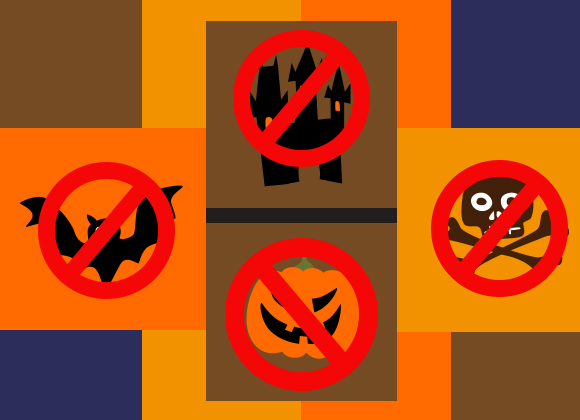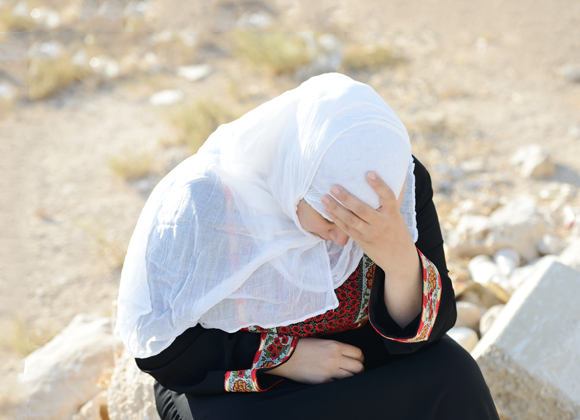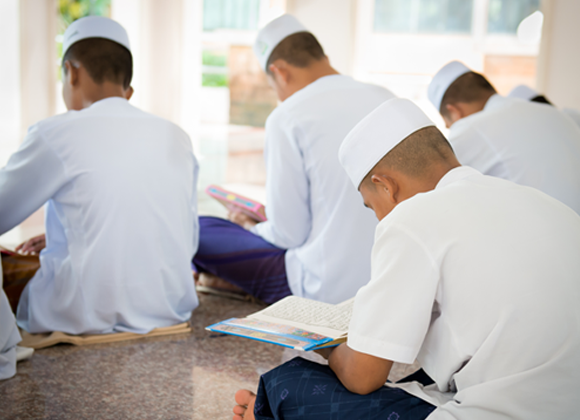
Too often, we are in the dark about the background of occasions and holidays like Halloween, Easter, etc. Don’t think this is a trivial matter because once you find out why these are celebrated, you will think twice about getting yourself or your kids involved in it.
Before you wish someone Happy Halloween and become a part of the celebrations, won’t it be great to take a quick look into its origin? I mean, it’s only logical to KNOW about a thing before celebrating it. Agreed?
Here goes – bismillah!
Halloween has its origins in the ancient Celtic festival known as Samhain. The festival of Samhain was a celebration of the end of the harvest season in Gaelic culture. Samhain was a time used by the ancient pagans to take stock of supplies and prepare for winter. The ancient Gaels believed that on October 31, the boundaries between the worlds of the living and the dead overlapped and the deceased would come back to life and cause havoc such as sickness or damaged crops. Masks and costumes were worn in an attempt to mimic the evil spirits or appease them.
The festival would frequently involve bonfires. It is believed that the fires attracted insects to the area which attracted bats to the area. These are additional attributes of the history of Halloween.
Roman and Christian influence:
By 43 AD, “Romans had conquered the majority of Celtic territory.” For the 400 years, they occupied Celtic lands, two Roman festivals: Feralia (the commemoration of the passing of the dead) and a day to honor Pomona (the Roman goddess of fruits and trees). The apple was served as a symbol for Pomona and might have been incorporated into Samhain by the practice of “bobbing for apples”.
When “local people converted to Christianity during the early Middle Ages, the Roman Catholic Church often incorporated modified versions of older religious traditions in order to win converts.” Pope Gregory IV wanted to substitute Samhain with All Saints’ Day in 835, but All Souls’ Day (Nov. 2nd) which is closer in resemblance to Samhain and Halloween today, was “first instituted at a French monastery in 998 and quickly spread throughout Europe”. 1 In the 16th century, “Christian village children celebrated the vigil of All Saints’ by doing the Danse Macabrloi. The Seven Brethren whose grizzly death is described in the seventh chapter of the deuterocanonical book of Second Macabees” is also said to have resulted in children dressing up in grizzly costumes to signify these deaths. 2
What is Halloween made of:
Traditional activities include trick-or-treating, bonfires, costume parties, visiting “haunted houses” and carving jack-o-lanterns.
Part of the history of Halloween is Halloween costumes. We find it innocent enough to let our children dress up as a Vampire or a Frankenstein at the parties held at a house or the very least, attend the school functions because the teacher says “it’s mandatory”. But we forget or are oblivious to the fact that the practice of dressing up in costumes and begging door to door for treats on holidays goes back to the Middle Ages, and includes Christmas wassailing. This was done so that the spirits of the dead would not recognize people. The Druids would actually sacrifice animals and sometimes humans and dress in these animal skins. Wearing these clothes, they would engage in fortune-telling. Another explanation is that today, children who dress up, represent these spirits.
Trick-or-treating resembles the late medieval practice of “souling,” when poor folk would go door to door on Hallowmas (November 1), receiving food in return for prayers for the dead on All Souls Day (November 2). Today, when kids are offered treats by neighbors, this goes back to the time people would offer food to appease the spirits.
Halloween can be a time for MAJOR Shirk (making partners with Allah![]() ). There are games and rituals which involve fortune-telling. Young people, for instance, try to see what their marriage prospects are by using omens like apple pairings that are thrown over their shoulders, or nuts being burned in a fire.
). There are games and rituals which involve fortune-telling. Young people, for instance, try to see what their marriage prospects are by using omens like apple pairings that are thrown over their shoulders, or nuts being burned in a fire.
Jack-o’-lantern started off as a legend associated with a man of Irish origin named Jack who supposedly enjoyed playing pranks on the Devil. After his death, Jack did not go to Heaven or Hell and therefore, had to wander the earth carrying a lantern which gave him some light to see where he was going. Pumpkins that were hollowed out and had candles lighted inside did the job and they were also supposed to scare evil spirits away.
The Islamic stance is clear:
When you look a few of these evidences, (there are a whole lot of them), you get the clear Islamic stance towards Halloween:
“Say: ‘None in the heavens and the earth knows the Ghayb (Unseen) except Allaah…’” [al-Naml 27:65]
This leaves no room for Halloween fortune-telling; and “Whoever imitates a people is one of them.” 3 puts an end to all the Halloween hype.
In Fataawa al-Lajnah al-Daa’imah, it says:
“The clear evidence from the Qur’aan and Sunnah – on which there is consensus among the early generations of the ummah – that there are only two Eids or festivals in Islam: Eid al-Fitr and Eid al-Adha. Any festivals other than these, whether they are connected to a person, a group, an incident or anything else, are innovated festivals and it is not permissible for the Muslims to celebrate them or approve of them, express joy on them or help with them in any way, because that is transgressing the sacred limits of Allaah![]() …”
…”
And to top it off, it becomes totally out of the league for us Muslims when it includes pagan-origins. It may seem very alluring to you with all the hype, and it may also be very difficult for you to stand apart from the mainstream crowd, but no matter how much fatwa shopping we do, how many ever “moderate” versions we try to seek, there is still just two words for it: not permissible.
And since it attracts children mostly, what with all the free candy, it becomes increasingly essential for parents to be proactive and handle the situation wisely.
Here are some handy tips for parents:
1. Be open and tell them the origin of Halloween and why our religion can’t allow it. Telling them the reason of banning it in the house will convince them more than any other lame excuse you could come up with.
2. Whenever you take away something from someone and leave a gap, never forget to provide them a suitable alternative. In this case, get your children to anticipate Eid more or get them involved into some other halal fun activities.
3. Another way is to keep them entertained on a daily basis. Sports, baking, hanging out with friends and food of their choice should be a regular-fun-thing in their time table. This way, they will not be so keen to seek it elsewhere.
4. Last but not the least, keep them away from school when Halloween parties take place. Because no matter how many times you tell them it’s wrong, they are bound to get influenced to be a part of its festivities. Remember, what your children SEE influences them more than what they HEAR. Your advice will not affect them if their environment preaches otherwise.
Closing Thoughts:
The Halloween hoop-la is crazy and seems like it takes over everyone every year. But instead of going with the tide, we need to educate ourselves and especially our kids about it and tell them why we do not become a part of its festivities. It’s not a bad thing to be different. Our religion gives us fun-off times (Come on, you just celebrated two Eids!) and-that should be enough for us. Having fun is absolutely permissible but going to extremes to have it and on the way trampling our beliefs is not only revolting but also implies our extreme lack of faith and lack of pride in our religion.
Moreover, it can promote useless phantom fears in the minds of our children and affect their psychology by getting them desensitized to the idea of begging/asking people for things. Hopefully trick or treat does not look so tempting now. It’s important to stay clear from these dangerous festivals because when we become a part of these things, we bear witness to that which is AGAINST our basic Aqeedah (creed). Watch out.








3 replies on “Halloween – Innocent Fun-Time, Spooky or Shirk?”
I am yet to see non Muslims celebrating Muslim festivals in their respective countries or cultures. Muslims should realize that every nation has their own festivals and they celebrate them as per their culture and beliefs and Muslims too should stick to their own festivals as they are designed as per our belief and Islamic culture. So if somebody is so keen to follow the west, please note that they too celebrate their own festivals and not ours.
Assalam-o-Alakium
as u said what halloween made up of ..you expalined all parts except haunted house ..can u please elaborate more about it ..if someboday wants to go just for fun and their niyah is not to celebrate halloween but Just for fun ..is that ok ?
Assalam-o-Alakium
as u said what halloween made up of ..you expalined all parts except haunted house ..can u please elaborate more about it ..if someboday wants to go just for fun and their niyah is not to celebrate halloween but Just for fun ..is that ok ?